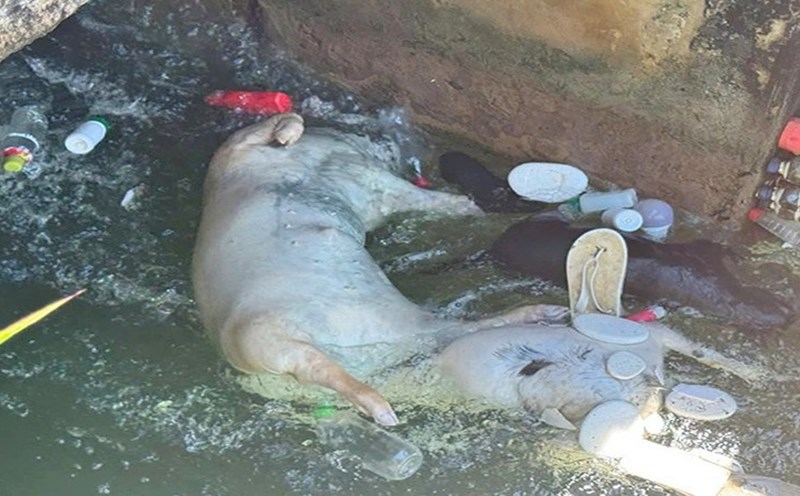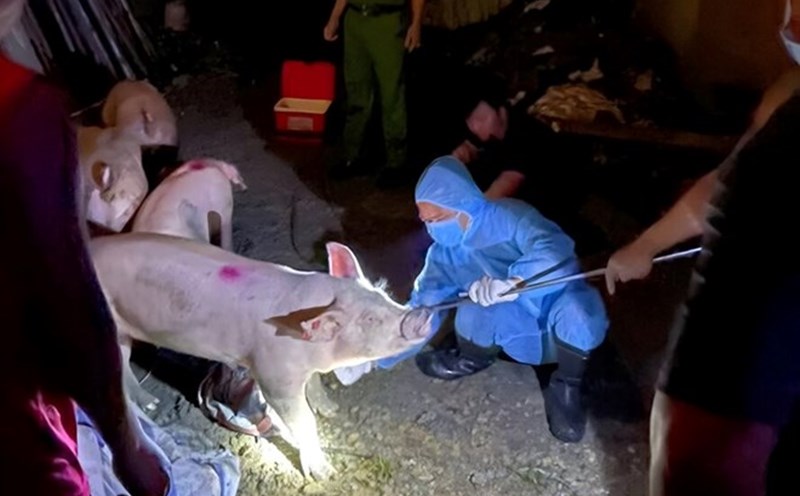Ex waiters in many localities
Since the initial outbreak in Kim Phu commune on May 15, African swine fever (DTLCP) has spread to 11 communes in Quang Tri province, killing and forcing the destruction of 1,801 pigs with a total weight of nearly 103 tons. Many livestock farming households are struggling with the epidemic, while the risk of a widespread outbreak is still very high.
Quang Trach commune was the locality that suffered the most damage with 10/13 villages recorded the epidemic, more than 880 pigs were destroyed. Here, large-scale livestock farming households such as Ms. Nguyen Thi Vinh's household fell into a situation of being left empty-handed just a few days after the outbreak.
Ms. Vinh said that despite applying strict epidemic prevention measures such as isolation, disinfection, and lime spraying, the epidemic spread could not be prevented. Currently, there are only about 15 sows and 150 breeding sows at risk of further destruction.
Other communes such as Phong Nha, Tan Thanh, Tuyen Lam, Trung Thuan also recorded a large number of dead pigs, with dozens of tons of meat having to be buried and destroyed. In Phong Nha commune, 447 pigs were destroyed, accounting for nearly 30 tons. The main reason for the rapid spread of the epidemic is said to be unfavorable weather conditions, not strict control of pig transportation, people are still subjective and do not report in time.
Urgently isolate and suppress the epidemic
Faced with complicated developments, the Department of Animal Husbandry and Veterinary Medicine of Quang Tri province has simultaneously deployed emergency measures. According to Mr. Duong Viet Phuong Tuan - Deputy Head of the Department, the unit has distributed more than 1,420 liters of VIA-IODINE chemicals to communes to disinfect outbreak areas and risk areas, and sent staff to stay close to the area to detect new outbreaks early.
The destruction of sick pigs is organized methodically and in accordance with regulations. For small-scale farming households, veterinary forces and village chiefs instructed them to destroy them right in the barn. Large herds were transported to remote areas for handling. The work of collecting samples, testing, monitoring of transportation, and slaughtering pigs has also been tightened.
The province has also issued a telegram requesting all levels and sectors to take drastic action, focus on containment and control of the epidemic. The People's Committees of communes and wards must proactively update the situation, develop response plans, organize general supervision, announce epidemics and end epidemics within their authority.
One of the important measures to prevent the spread of DTLCP is to enhance the role of people in disease prevention. The provincial Veterinary Department emphasized that livestock farming households must strictly implement the 5-no principle: do not hide epidemics; do not transport sick pigs; do not consume dead pigs; do not throw pork carcasses into the environment; do not use untreated excess feed.
At the same time, people are advised not to herd again until the end of the epidemic has been announced, and to immediately notify the authorities when the pigs show signs of suspected disease. Proactive declaration and close cooperation with veterinary agencies are considered a "shield" for early detection, quick handling, limiting damage to both farmers and the local livestock industry.
African swine fever does not spread to humans but causes great economic losses. If not well controlled, the epidemic can continue to spread, affecting the food supply chain and social security.
Currently, inspection, supervision, disinfection, and epidemic prevention propaganda are being focused on by all levels, sectors, and localities with the determination not to let the epidemic get out of control.











